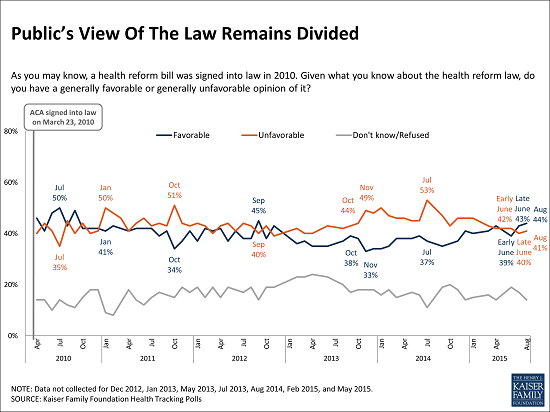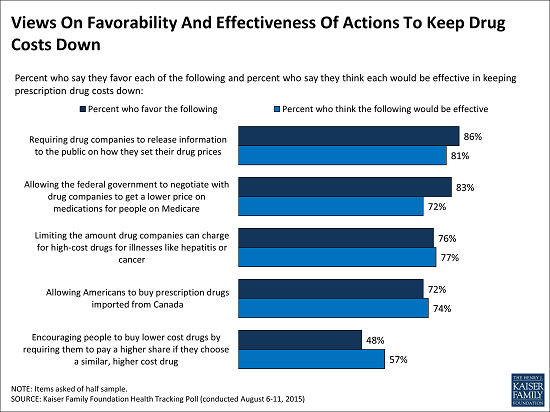
The independent source for health policy research, polling, and news.
Most Say They Can Afford Their Prescription Drugs, But One in Four Say Paying is Difficult, Including More Than Four in Ten People Who are Sick
Contacts
Large Bipartisan Majorities Support Range of Policy Changes They Believe Would Curb Drug Costs
Opinion on the Affordable Care Act Remains Largely Unchanged In August
About half of Americans (54%) report currently taking a prescription drug, and a large majority of them (72%) say their prescriptions are very or somewhat easy to afford. However, about a quarter (24%) say paying for their drugs is difficult, and the share facing difficulties rises among those with low incomes (33%) or currently taking four or more prescription drugs (38%), and is highest for those in fair or poor health (43%).
These are among the findings from the August Kaiser Health Tracking Poll, which expands on findings from earlier this year looking at prescription drug costs. The new poll finds strong majorities of the public support a wide range of policy actions to lower the costs of prescription drugs. At least seven in 10 support each of these four potential policy changes:
- 86 percent support requiring drug companies to release information on how they set prices, an idea proposed in legislatures in several states, including majorities of Democrats (90%), Republicans (82%), and independents (84%);
- 83 percent support allowing the government to negotiate with drug companies to lower prices for people with Medicare, including majorities of Democrats (93%), Republicans (74%), and independents (83%);
- 76 percent support limiting how much drug companies can charge for high-cost drugs for illnesses such as hepatitis or cancer, including majorities of Democrats (79%), Republicans (70%), and independents (77%); and
- 72 percent support allowing Americans to buy prescription drugs imported from Canada, including majorities of Democrats (69%), Republicans (75%), and independents (76%).
Fewer (48%) support changes to encourage consumers to use low-cost drugs by charging them a larger share of the costs when they choose a higher-cost alternative.
Majorities view each of these changes as likely to be effective at reducing drug costs, ranging from 81 percent who say requiring public disclosure about how drug companies set prices would be effective to 57 percent who say so about charging consumers more when they choose high-cost drugs over lower-cost ones.
Most of the public (62%) says that prescription drugs developed in the past 20 years have made lives of people in the U.S. better, including 42 percent who say a lot better. Far fewer say they have made them worse (15%) or say they haven’t made much difference (19%). However, the survey also finds a large majority of the public view the cost of prescription drugs as unreasonable (72%). Similar shares say that drug companies make too much profit (73%) and that they are too concerned about profits and not concerned enough about patients (74%).
The survey also assesses the public’s perception of pharmaceutical companies in comparison to other industries. Among the public overall, 42 percent hold a favorable view of pharmaceutical companies, similar to the share holding a favorable view of oil companies (40%) and health insurers (44%) but smaller than the share saying so about doctors (78%), food manufacturers (58%), banks (58%), and airlines (55%).
The August poll also continues tracking opinion on the ACA:
- On the ACA overall, the poll finds the public remains closely divided, with 44 percent reporting a favorable view of the law and 41 percent reporting an unfavorable view, statistically unchanged from recent months. As in the past, most Democrats hold a favorable view (76%), most Republicans an unfavorable one (71%), and independents are more evenly split (46% unfavorable, 39% favorable).
- Opinion about what Congress should do next when it comes to the law also has been fairly constant over time. Equal shares (28%) say that they want Congress to expand what the law does and that they want a complete repeal of the law, with the remainder falling in between by saying either they want Congress to continue implementing the law as it is (22%) or scale it back (12%).
- Those who want Congress to repeal the law in its entirety are split about what should happen next: 12 percent of the public overall say they think Congress should replace the law with a Republican-sponsored alternative, while 11 percent say they would like the law repealed and not replaced.

The poll was designed and analyzed by public opinion researchers at the Kaiser Family Foundation and was conducted from August 6-11, 2015 among a nationally representative random digit dial telephone sample of 1,200 adults. Interviews were conducted in English and Spanish by landline (480) and cell phone (720). The margin of sampling error is plus or minus 3 percentage points for the full sample. For results based on other subgroups, the margin of sampling error may be higher.
